The Committee took note of the progress made consequent to the Companies (Amendment) Act, 2019, which had resulted in de-criminalisation of 16 minor procedural/technical lapses under the Companies Act, 2013 into ‘civil wrongs’, and adopted a principle-based approach to further remove criminality, in case of defaults which can be determined objectively and which, otherwise, lack the element of fraud or do not involve larger public interest. Alternative methods of imposing sanctions have also been explored and recommended by the Committee, in some cases.
In Chapter I of the report, the Committee has proposed amendments in 46 penal provisions, so as to either remove criminality, or to restrict the punishment to only fine, or to allow rectification of defaults through alternative methods, which would lead to further de-clogging of the criminal justice system in the country. The main recommendations of the Committee in Chapter 1 are as follows:
- Re-categorising 23 offences out of the 66 remaining compoundable offences under the Act, to be dealt with in the in-house adjudication framework wherein these defaults would be subject to a penalty levied by an adjudicating officer. In addition, the quantum of penalties recommended are lower than the quantum of fines presently provided in the Act.
- Omitting, altogether, 7 compoundable offences; limiting punishment for 11 compoundable offences to only fine by removing provision for imprisonment and recommending that 5 offences be dealt under alternative frameworks;
- Reducing the quantum of penalties in respect of 6 provisions, which were shifted to the in-house adjudication framework through the recently passed Companies (Amendment) Act, 2019;
- Retention of status-quo in case of the non-compoundable offences.
In Chapter 2, the Committee has made recommendations targeted towards providing further ease of living for law-abiding corporates, which are as follows:
Power to exclude a certain class of companies from the definition of ‘listed company’, mainly for the listing of debt securities, in consultation with SEBI;
-
- Clarifying the trial court’s jurisdiction on the basis of place of commission of offence under Section 452, for wrongful withholding of property of a company by its officers/employees;
- Including the provisions of Part IXA (Producer Companies) of the Companies Act, 1956 in the Companies Act, 2013;
- Proposing benches of the National Company Law Appellate Tribunal;
- Provisions for allowing payment of adequate remuneration to non-executive directors in case of inadequacy of profits, by aligning the same with the provisions for remuneration to executive directors in such cases;
- Relaxing provisions related to the imposition of higher additional fees under the third proviso to Section 403(1);
- Extending applicability of Section 446B (lower penalties for small companies and one-person companies) to all provisions which attract monetary penalties and extending the benefit to producer companies and start-ups also;
- Excluding certain companies/bodies corporate from the applicability of Section 89 (declaration of a beneficial interest in shares) and Chapter XXII (companies incorporated outside India);
- Reducing timelines so as to speed up rights issues under Section 62;
- Extending exemptions from filing of certain resolutions to certain classes of non-banking financial companies under Section 117 in consultation with RBI;
- Providing power to enhance the thresholds which trigger the applicability of Corporate Social Responsibility provisions;
- Non-levy of penalties for delay in filing the annual returns and financial statements in certain cases.
In addition, the committee while deliberating on certain other issues felt that wider consultation would be necessary and recommended that the following be taken up in due course, at a later stage;
- Providing for appeal against the orders of the Regional Directors before the NCLT after due examination;
- Exempting certain private placement requirements for Qualified Institutional Placements (QIPs) after due consultation with SEBI;
- Reviewing provisions on disqualification of directors after due consultation and examination;
- Reviewing provisions in respect of debarment of audit firms after due consultation and examination;
Ministry of Corporate Affairs
[Source: PIB]







